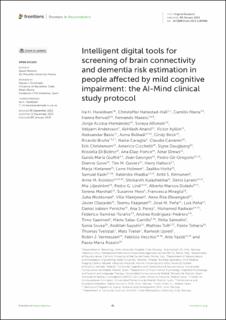| dc.contributor.author | Haraldsen, Ira Hebold | |
| dc.contributor.author | Hatlestad-Hall, Christoffer | |
| dc.contributor.author | Marra, Camillo | |
| dc.contributor.author | Renvall, Hanna | |
| dc.contributor.author | Maestú, Fernando | |
| dc.contributor.author | Acosta-Hernández, Jorge | |
| dc.contributor.author | Alfonsin, Soraya | |
| dc.contributor.author | Andersson, Vebjørn | |
| dc.contributor.author | Anand, Abhilash | |
| dc.contributor.author | Ayllón, Victor | |
| dc.contributor.author | Babic, Aleksandar | |
| dc.contributor.author | Belhadi, Asma | |
| dc.contributor.author | Birck, Cindy | |
| dc.contributor.author | Bruña, Ricardo | |
| dc.contributor.author | Caraglia, Naike | |
| dc.contributor.author | Carrarini, Claudia | |
| dc.contributor.author | Christensen, Erik | |
| dc.contributor.author | Cicchetti, Americo | |
| dc.contributor.author | Daugbjerg, Signe | |
| dc.contributor.author | Di Bidino, Rossella | |
| dc.contributor.author | Diaz-Ponce, Ana | |
| dc.contributor.author | Drews, Ainar | |
| dc.contributor.author | Giuffrè, Guido Maria | |
| dc.contributor.author | Georges, Jean | |
| dc.contributor.author | Gil-Gregorio, Pedro | |
| dc.contributor.author | Gove, Dianne | |
| dc.contributor.author | Govers, Tim M. | |
| dc.contributor.author | Hallock, Harry | |
| dc.contributor.author | Hietanen, Marja | |
| dc.contributor.author | Holmen, Lone | |
| dc.contributor.author | Hotta, Jaakko | |
| dc.contributor.author | Kaski, Samuel | |
| dc.contributor.author | Khadka, Rabindra | |
| dc.contributor.author | Kinnunen, Antti S. | |
| dc.contributor.author | Koivisto, Anne M. | |
| dc.contributor.author | Kulashekhar, Shrikanth | |
| dc.contributor.author | Larsen, Denis | |
| dc.contributor.author | Liljeström, Mia | |
| dc.contributor.author | Lind, Pedro | |
| dc.contributor.author | Marcos Dolado, Alberto | |
| dc.contributor.author | Marshall, Serena | |
| dc.contributor.author | Merz, Susanne | |
| dc.contributor.author | Miraglia, Francesca | |
| dc.contributor.author | Montonen, Juha | |
| dc.contributor.author | Mäntynen, Ville | |
| dc.contributor.author | Øksengård, Anne Rita | |
| dc.contributor.author | Olazarán, Javier | |
| dc.contributor.author | Paajanen, Teemu | |
| dc.contributor.author | Peña, José M. | |
| dc.contributor.author | Peña, Luis | |
| dc.contributor.author | Peniche, Daniel lrabien | |
| dc.contributor.author | Sanz Perez, Ana | |
| dc.contributor.author | Radwan, Mohamed | |
| dc.contributor.author | Ramírez-Toraño, Federico | |
| dc.contributor.author | Rodríguez-Pedrero, Andrea | |
| dc.contributor.author | Saarinen, Timo | |
| dc.contributor.author | Salas-Carrillo, Mario | |
| dc.contributor.author | Salmelin, Riitta | |
| dc.contributor.author | Sousa, Sonia | |
| dc.contributor.author | Suyuthi, Abdillah | |
| dc.contributor.author | Toft, Mathias | |
| dc.contributor.author | Toharia, Pablo | |
| dc.contributor.author | Tveitstøl, Thomas | |
| dc.contributor.author | Tveter, Mats | |
| dc.contributor.author | Upreti, Ramesh | |
| dc.contributor.author | Vermeulen, Robin J. | |
| dc.contributor.author | Vecchio, Fabrizio | |
| dc.contributor.author | Yazidi, Anis | |
| dc.contributor.author | Rossini, Paolo Maria | |
| dc.date.accessioned | 2024-03-21T06:42:11Z | |
| dc.date.available | 2024-03-21T06:42:11Z | |
| dc.date.created | 2024-03-15T08:42:09Z | |
| dc.date.issued | 2023 | |
| dc.identifier.citation | Frontiers in Neurorobotics. 2023, 17 . | en_US |
| dc.identifier.uri | https://hdl.handle.net/11250/3123495 | |
| dc.description.abstract | More than 10 million Europeans show signs of mild cognitive impairment (MCI), a transitional stage between normal brain aging and dementia stage memory disorder. The path MCI takes can be divergent; while some maintain stability or even revert to cognitive norms, alarmingly, up to half of the cases progress to dementia within 5 years. Current diagnostic practice lacks the necessary screening tools to identify those at risk of progression. The European patient experience often involves a long journey from the initial signs of MCI to the eventual diagnosis of dementia. The trajectory is far from ideal. Here, we introduce the AI-Mind project, a pioneering initiative with an innovative approach to early risk assessment through the implementation of advanced artificial intelligence (AI) on multimodal data. The cutting-edge AI-based tools developed in the project aim not only to accelerate the diagnostic process but also to deliver highly accurate predictions regarding an individual’s risk of developing dementia when prevention and intervention may still be possible. AI-Mind is a European Research and Innovation Action (RIA H2020-SC1-BHC-06-2020, No. 964220) financed between 2021 and 2026. First, the AI-Mind Connector identifies dysfunctional brain networks based on high-density magneto- and electroencephalography (M/EEG) recordings. Second, the AI-Mind Predictor predicts dementia risk using data from the Connector, enriched with computerized cognitive tests, genetic and protein biomarkers, as well as sociodemographic and clinical variables. AIMind is integrated within a network of major European initiatives, including The Virtual Brain, The Virtual Epileptic Patient, and EBRAINS AISBL service for sensitive data, HealthDataCloud, where big patient data are generated for advancing digital and virtual twin technology development. AI-Mind’s innovation lies not only in its early prediction of dementia risk, but it also enables a virtual laboratory scenario for hypothesis-driven personalized intervention research. This article introduces the background of the AI-Mind project and its clinical study protocol, setting the stage for future scientific contribution. | en_US |
| dc.language.iso | eng | en_US |
| dc.rights | Navngivelse 4.0 Internasjonal | * |
| dc.rights.uri | http://creativecommons.org/licenses/by/4.0/deed.no | * |
| dc.title | Intelligent digital tools for screening of brain connectivity and dementia risk estimation in people affected by mild cognitive impairment: the AI-Mind clinical study protocol | en_US |
| dc.type | Peer reviewed | en_US |
| dc.type | Journal article | en_US |
| dc.description.version | publishedVersion | en_US |
| cristin.ispublished | true | |
| cristin.fulltext | original | |
| cristin.qualitycode | 1 | |
| dc.identifier.doi | 10.3389/fnbot.2023.1289406 | |
| dc.identifier.cristin | 2254610 | |
| dc.source.journal | Frontiers in Neurorobotics | en_US |
| dc.source.volume | 17 | en_US |
| dc.source.pagenumber | 15 | en_US |
| dc.relation.project | EC/H2020/No. 964220 | en_US |

